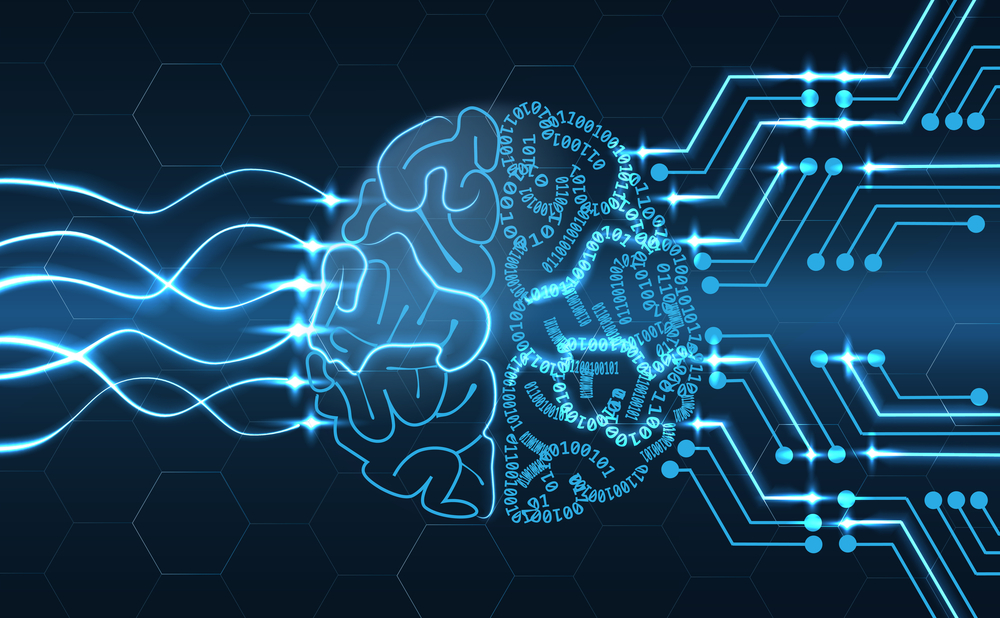Artificial intelligence applied to business is an issue at various companies, but how it functions, and its potential is not always understood.
Allied to technological advances, artificial intelligence (also known as AI), has been used to improve processes, generate value, increase competitiveness and attain better results.
To achieve this, however, it is important to transform the culture at a company and have it completely dedicated to data analysis.
This post will discuss artificial intelligence applied to business, the importance of adopting a data driven culture, the technologies that can be used in the context and the possibilities of this technology for companies.
What is artificial intelligence applied to business?
The definition of artificial intelligence has changed considerably over the years, but nearly always refers to the attempt to simulate the human capacity to think, making computing systems able to “learn”, “reason”, “interpret” and take decisions similarly to human beings.
For a long time, artificial intelligence was understood to involve only those systems able to resolve problems or capable of conducting very specific tasks, such as playing chess with humans.
However, technological advances have shaped its development and today AI solutions are part of a data driven approach, that is, a culture based on collecting, processing, analyzing and interpreting data.
The purpose of this effort is to improve processes, increase competitiveness and bring better results to companies.
Artificial Intelligence is not a commodity
With technology advances and innovative solutions constantly arising and gaining space in the media, the concept of artificial intelligence has become well known to the public and to companies.
Yet this movement creates false expectations among many entrepreneurs and business administrators who are looking for “ready-made” AI solutions to adopt at their companies.
Nevertheless, it is important to highlight that artificial intelligence is not a commodity, that is, it is not an “off-the-shelf” product that serves any type of business. Solutions must be developed according to the reality, context, and objectives of each company.
It is important to note that there are complete AI solutions on the market for general contexts, such as APIs for voice recognition or systems for identification of specific objects in images. In these solutions, intelligent systems are fed with generic data.
However, when we refer to companies, the reality is different. In fact, the differentiation and customization of artificial intelligence for each specific business are some of the main keys to the success of these solutions.
The important data
Each company generates its own data and develops its own products or services, specific to the segment in which it operates. Therefore, it is natural to understand that a solution developed for a small company that focuses on lower class youth cannot be implemented in the same way at a multinational company that serves older people with high purchasing powe.
Thus, the success or failure of an artificial intelligence project at a company will depend on the data that it generates and is available to it. This indicates that “off-the-shelf” solutions are usually not viable. After all, many companies still do not have large datacenters or a structure that is suitable to the development of this type of project, either physically or cloud-based.
The implantation of AI projects thus involves a series of prior definitions that help a company to define the performance metrics that should be followed, and on this basis generate the data, through research and development, which allows creating a specific model.
Data driven culture
As we see, the implantation of artificial intelligence projects depends largely on the efficient use of a large volume of data generated by the company itself. This requires a revision of the internal culture at a company, and placing data at the center of decision making, and the strategic planning of the company.
This is called data driven culture. The term was created to define processes guided by data. That is, when decisions are made based on the collection and analysis of information, not on strategies based on hunches, intuition or instincts.
For this culture to strengthen at a company, it is important to create efficient methods for the collection, processing, analysis and interpretation of large volumes of data. A series of tools and technologies exists that can assist in this process, highlighted by Big Data and Business Intelligence. The tools and processes should also be capable of guaranteeing the quality of information and governance of data.
This directly involves the use of technology, such as ERPs, and CRMs, to capture data in a systematic and automated manner, and to transform the organizational culture of a business, placing data at the center not only of management, but also the action of employees.
Read more: What is needed to make my factory intelligent?
Types of technologies
A variety of concepts and technologies are part of the broad concept of artificial intelligence and can be applied to business, including subfields and complementary fields of knowledge. Some examples are:
Data Science
Data science is an interdisciplinary field of computing that is based on obtaining and analyzing data (economic, social and financial) to generate insights that help guide decision-making and create strategies.
It has only recently become a specific field of study and has roots in statistical analysis and data mining. One way to extract knowledge is by detecting patterns to reveal trends and improve the predictive capacity of companies, making them more competitive.
Machine Learning
A key concept of artificial intelligence is machine learning – a methodology in which systems are capable of learning and evolving completely or partially autonomously. We can affirm that without machine learning artificial intelligence would not be as we know it today.
This is only possible due to complex algorithms that provide these machines the ability to read information, identify patterns and conduct the logical processing of data to make decisions supported by their own experience. The great distinction of machine learning is therefore its ability to adapt, thus creating a more dynamic system that depends less on human intervention.
Deep Learning
Deep Learning is another important base for modern AI. This concept can be understood as a deepening of machine learning, making it even more complex and intelligent. Deep Learning uses even more sophisticated algorithms, based on the concept of highly complex artificial neural networks, inspired by neural connections found in the human brain.
Allied to strong advances in computing technology in recent years, this methodology is capable of learning complex patterns and interpreting large volumes of data, generating more accurate results with greater detail.
Applying artificial intelligence to business
There are various ways that artificial intelligence can be applied to business. We will highlight a few.
Utilization of Data
This is an AI system that makes better use of the data generated through the storage and processing of information in a system. This facilitates obtaining insights and analyses, which results in more assertive decision making.
Crossing Information
As we saw, one of the strong points of artificial intelligence and its subfields is the capacity to cross information to identify patterns and trends and generate insights.
The crossing of information is very common in the field of healthcare, for example, in which AI systems analyze different kinds of data to identify possible relations between illness, symptoms or medications, to allow discoveries that contribute to medical advances.
Predictions
An analysis of optimized data increases a company’s predictive capacity, generating more accurate forecasts, whether about market movements, the reality of the segment in which it operates or the behavior of its clients.
With this type of information in hand, a company is able to forecast situations and results to improve its strategies and attain competitive advantages.
This functionality can be seen, for example, in agribusiness, with the use of intelligent farm machinery that cross data collected in the field with other information about the weather, generating forecasts that improve production.
Security
Artificial intelligence can also be an important ally to avoid fraud and cyber-attacks at companies.
With the help of AI, it is possible to create more complex algorithms that are able to cross data to identify potential threats, new forms of attacks or attempts at fraud.
The financial sector has benefited from the alliance between forecasting models and security technologies in artificial intelligence solutions that help protect its processes and data.
Do you want to learn more about Artificial Intelligence solutions applied to business? Contact us and discover more about Invent, the innovation project promoted by CERTI.










